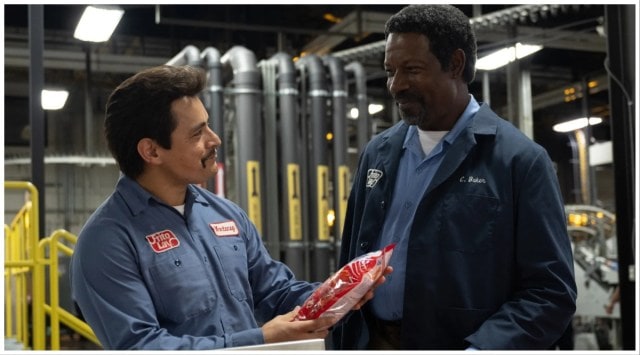Flamin’ Hot movie review: Eva Longoria’s Cheetos film is exciting, empowering, and energetic
Flamin' Hot movie review: Debutant director Eva Longoria instills great energy into the story of Richard Montañez, a man who, while working as a janitor at Frito-Lay in the 1990s, claimed to have created the Flamin' Hot flavour of Cheetos.
 Jesse Garcia and Dennis Haysbert in a still from Flamin' Hot.
Jesse Garcia and Dennis Haysbert in a still from Flamin' Hot. A few years ago, when it was announced that Ranveer Singh would star in a film called Jayeshbhai Jordaar, many were led to believe that the movie was about one of the most legendary success stories of Indian cottage industry — Lijjat, founded by a collective of women who used word-of-mouth marketing to push consumer products to households across the country. The handful of people who actually watched the movie were in for a rude awakening, when they discovered that Jayeshbhai Jordaar was actually about a woman who was used as a breeding machine by the patriarchy, told through the perspective of her male saviour husband.
Inadvertently, Jayeshbhai Jordaar’s tone-deafness also left viewers convinced that the movie they’d cooked up in their minds — a movie about a bunch of enterprising women selling papads — would’ve been better than the one they’d just watched. But for some reason (presumably legal), Bollywood doesn’t do movies about corporate success, which is odd, considering how obsessed we are, as a culture, about aspirational cinema (and Shark Tank). Films like Guru and Manthan exist, sure, but they lack the very specific kind of thrill that recognisable iconography can conjure in the consumer’s mind. In other words, they don’t mention Reliance or Amul.
But this year, a trio of English-language movies has not only tried to capture this entrepreneurial spirit on screen, but also invited valid discussion about capitalism and corporate worship. After Ben Affleck’s excellent Air, about Nike’s mission to sign Michael Jordan, and the the edgy Canadian gem Blackberry, about the rise and fall of the tech company that invented the smartphone, we now have Flamin’ Hot, an uplifting drama about a Mexican-American man who, while working as a janitor at Frito-Lay in the 1990s, claimed to have created with his wife the iconic flavour of Cheetos that the movie is named after.
Richard Montañez’s story about inventing a spicy version of the snack has been disputed, but the movie doesn’t allude to this at all. In fact, Flamin’ Hot has little room for skullduggery, although it occasionally slips into fantastical comedic bits that, at the very least, confirm debutant director Eva Longoria’s awareness of the alleged fabrication. But the movie is so consistently upbeat, and the conflict in it so effortlessly resolved, that you could be forgiven for assuming that all of it is made up after all.
As played by charismatic Jesse Garcia, Richard is shown as a golden-hearted man who aims for upward mobility, and meets several well-wishers along the way who enable his success. Flamin’ Hot, in addition to being a heart-warming immigrant tale and an inspiring story about the power of representation, is ultimately a fable about perseverance.
While Affleck made the wise decision to construct Air — a movie about a sad sack middle-aged white man who leveraged Black talent to make an already rich corporation even richer — as a sports drama complete with an underdog hero, Longoria avoids the inevitable pro-capitalism criticism by designing Flamin’ Hot as a story about minorities. Destined for a hard life on the streets, Richard strived, from a very young age, to break the shackles of a society that looked down on people like him. In primary school, he silenced his bullies by feeding them the same Mexican food that they’d make fun of him for eating. And while he was at it, he made a killing. Faced with the prospect of peddling drugs or doing right by his young family, Richard chose to take up a janitorial position at Fritos’ Rancho Cucamonga plant.
As portrayed in the film, he’s a smooth talker with charm to spare, someone who has a pitch at the ready for every situation — from why he should be hired for the janitorial job even though he doesn’t have a high school degree (“I’m a PhD; poor, hungry, determined”), to why Frito-Lay should appeal to the untapped Latino demographic if it wants to survive as a company.
Longoria takes Lewis Colick and Linda Yvette Chávez’s schmaltzy script and sprinkles it with a dash of spice. There’s an energy to Flamin’ Hot that almost makes you feel like you’re watching someone dance — in many ways, it’s like Goodfellas for children. But there’s also a deep sense of pride; Flamin’ Hot is, after all, about an entire community, and not just one person. On a meta level, the movie could even be about Hollywood. Because of a lack of representation at the top level of corporate management, Frito-Lay simply didn’t pay attention to minorities and underestimated their purchasing power. And when the company finally began acknowledging the Latin community’s tastes and desires after Richard’s persistent pitches, it had no idea how to market products to them.
A scene towards the end of the movie, in which the entire Rancho Cucamonga plant bands together to promote Flamin’ Hot Cheetos on the street is right out of Hum Hain Rahi Pyar Ke. You want nothing more than for these regular people, many of whom will never be as ambitious as Richard, to unite in an effort to see one of their own succeed. Just as Air briefly transformed Nike — valued at that time at $900 million — into the underdog, Flamin’ Hot convinces you, for roughly 90 minutes, that one man’s quest to sell a unique flavour of a very unhealthy processed snack is somehow tied to his cultural identity. But Flamin’ Hot works as a piece of crowd-pleasing entertainment not because we want Frito-Lay to win, but Richard to. Ah, the movies.
Flamin’ Hot
Director – Eva Longoria
Cast – Jesse Garcia, Annie Gonzalez, Dennis Haysbert, Tony Shalhoub
Rating – 4/5






































